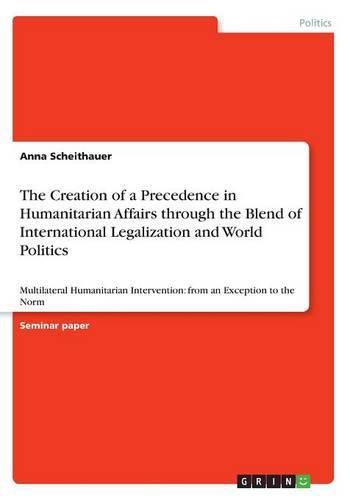Readings Newsletter
Become a Readings Member to make your shopping experience even easier.
Sign in or sign up for free!
You’re not far away from qualifying for FREE standard shipping within Australia
You’ve qualified for FREE standard shipping within Australia
The cart is loading…






Seminar paper from the year 2012 in the subject Politics - International Politics - Topic: Peace and Conflict Studies, Security, grade: A (American System), University of Illinois at Urbana-Champaign, language: English, abstract: The research paper sets out to explore the motivations behind Security Council Resolution (SCR) 688 on the internal civilian situation in Iraq after the Gulf War in 1991 embodying the jump-start for the implementation of the today well-known concept of multilateral humanitarian interventions with the international community intervening in a states’ domestic affairs on humanitarian grounds. Thereby, the puzzle surrounding the document evolves around the question of its content’s legitimacy with view to international law and political implications, figuring a rather grey area which, however, had a tremendous impact on future actions, commitments and reasoning applied by the international community. Thus, the central questions the paper addresses in this regard relate to the debate on the impact of norms as a lock-in mechanism in international treaty law reflecting on how and why at exactly this point in time a new principle respectively doctrine was born. For this purpose the examination of the intertwining of systemic changes in the world system with the international community’s moral convictions, political inferences and the forms of legalization chosen will shed a light on the origination, the content and impacts of SCR 688 supporting the creation of a new world order. Thereby, special emphasis has been put on the political reasoning in the Security Council of the United Nations as well as on the three dimensions of legalization: precision, obligation and delegation. The findings have drawn attention to how SCR 688 served as a precedence for all multilateral humanitarian interventions leading to a change in the conception of state sovereignty and the raise of a moral conviction of a Responsibility to Protect (R2P) by the internation
$9.00 standard shipping within Australia
FREE standard shipping within Australia for orders over $100.00
Express & International shipping calculated at checkout
Seminar paper from the year 2012 in the subject Politics - International Politics - Topic: Peace and Conflict Studies, Security, grade: A (American System), University of Illinois at Urbana-Champaign, language: English, abstract: The research paper sets out to explore the motivations behind Security Council Resolution (SCR) 688 on the internal civilian situation in Iraq after the Gulf War in 1991 embodying the jump-start for the implementation of the today well-known concept of multilateral humanitarian interventions with the international community intervening in a states’ domestic affairs on humanitarian grounds. Thereby, the puzzle surrounding the document evolves around the question of its content’s legitimacy with view to international law and political implications, figuring a rather grey area which, however, had a tremendous impact on future actions, commitments and reasoning applied by the international community. Thus, the central questions the paper addresses in this regard relate to the debate on the impact of norms as a lock-in mechanism in international treaty law reflecting on how and why at exactly this point in time a new principle respectively doctrine was born. For this purpose the examination of the intertwining of systemic changes in the world system with the international community’s moral convictions, political inferences and the forms of legalization chosen will shed a light on the origination, the content and impacts of SCR 688 supporting the creation of a new world order. Thereby, special emphasis has been put on the political reasoning in the Security Council of the United Nations as well as on the three dimensions of legalization: precision, obligation and delegation. The findings have drawn attention to how SCR 688 served as a precedence for all multilateral humanitarian interventions leading to a change in the conception of state sovereignty and the raise of a moral conviction of a Responsibility to Protect (R2P) by the internation